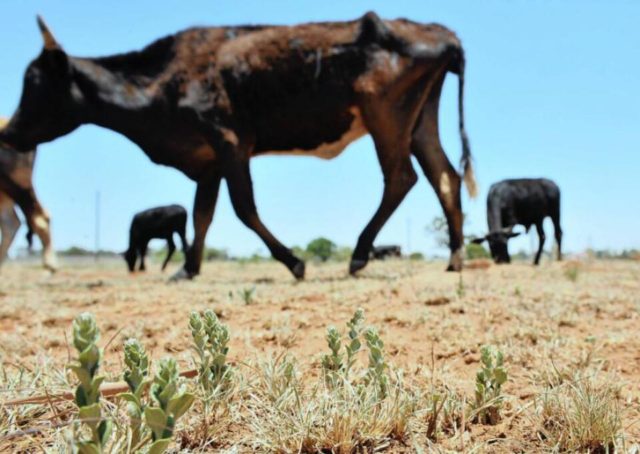Herd sizes have been depleted and, in some cases, farmers have had to close shop as they watch their animals starve to death.
THE DEVASTATING drought that has plagued various parts of South Africa for several years has crippled many Prieska farmers.
Farmers in the area have been on their knees for more than a year, with cattle farmers in particular taking strain. Herd sizes have been depleted and, in some cases, farmers have had to close shop as they watch their animals starve to death.
This is the grim picture portrayed by Philip Roux, a Beefmaster Group cattle farmer, vice-chairman of the non-profit organisation (NPO) Prieska Droogtehulp and resident of drought-stricken Prieska in the Northern Cape. He says the community is confronted daily by the impact of the drought.
“Farmers who have been in the area for generations are simply no longer able to afford feeding their animals,” Roux said, adding that farmers in the community were begging for fodder to keep their animals alive.
This is despite the recent news of drought being revoked as a state of national disaster, which has left many farmers without financial assistance and animal feed provisions to support their families, farm workers and animals.
“Emerging farmers are particularly vulnerable. Many are forced to watch as their animals starve to death because they do not have the funds readily available to afford to feed them,” explained Roux.
According to the most recent Agriculture Drought Report compiled by AgriSA, the agricultural sector lost 31 000 jobs and approximately R7 billion in turnover between 2018 and 2019 due to the drought.
While this sector has experienced some optimism due to increased rainfall in various parts of the country recently, expecting future positive spin-offs, Roux says drought-stricken areas are still a far way off from a recovery.
“It is still extremely dry in many parts of Prieska, some areas look like a desert. Indigenous plants that are resistant to severe drought conditions are dead. The field will take years to recover after good general rains,” says Roux.
The ongoing drought has a wider impact on communities, not only farmers.
“Unemployment is a reality. Our whole community has become impoverished and it affects all businesses in Prieska as well as schools, churches and the municipality. Most of our community comprises of farmers and when they suffer, all the businesses suffer too,” Roux added.
He pointed out that hardships caused by the drought were not unique to Prieska, but was a concern of most of the Karoo and the rest of the country.
“Donations of cash, feed and food for farmers and their workers on the farms will still be needed for next year. People don’t realise the extent of the drought in the Karoo. There are many other areas in desperate need of relief,” Roux said.
Beefmaster Group, a leading specialist producer and exporter of beef products, is helping struggling farmers in drought-stricken areas with animal feed and other necessities. The group is calling on businesses and organisations to support drought-stricken communities in South Africa by heeding Roux’s call for donations.
“We support and rely on local cattle farmers from across Southern Africa to supply us with cattle. Through these partnerships, we have witnessed the harsh impact of the ongoing severe drought in many farming towns around the country,” Roelie van Reenen, supply chain executive of the Beefmaster Group, said.
“We urge everyone who can to support initiatives that help farmers and impoverished communities affected by the drought which will, in turn, ensure that the meat industry remains profitable, a stable source of revenue, continues to provide job security, and ultimately sustain the livelihoods of many,” concluded van Reenen.








